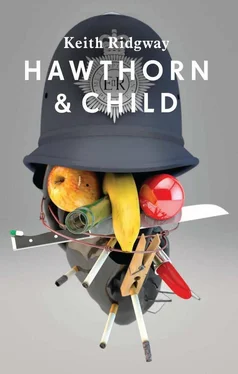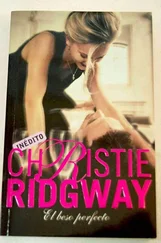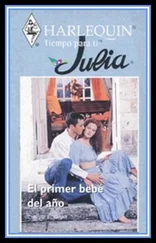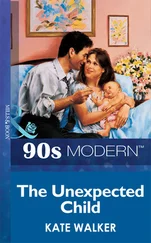— They spray her with anything?
— Yeah.
— What?
— I don’t know.
— Why haven’t they moved her?
— No one has signed off on it yet. The other detectives left, to …
— OK, OK. What have forensics done?
— Everything except the body. And by the body. Around the body.
Hawthorn looked at the kitchen window. It was blackened, like a bucket of paint had been flung over the corner near the cooker. Cracks had appeared. There was a hole punched through the top corner. The bricks above it glistened. He walked over. There was something … a cable, running through the extractor fan hole and tight across the wall, and back in through the corner of the window.
— Look. Look what she’s done.
Child came over. They stood there. They stood there studying the cable for a long time, and Child shared his mints with Hawthorn, and Hawthorn gave Child a clean tissue.
They went back inside.
Hawthorn looked at her. It took a moment to work out which way she was facing, and that the smudged thumbprint on her head was the remains of her face. Her legs were no longer discrete limbs but had merged into something very like a cheap Christmas candle, melted, and it took him a while to recognize the glint in the red wax as exposed bone. The smell was baked sweet.
People watched them. Hawthorn didn’t know what to do.
Child stepped closer to her. He held his nose and looked carefully where he put his feet. The cooker and the floor in front of it were covered in a layer of fat and foam.
— Where are her hands?
Hawthorn took a step. He stopped. He didn’t know where her hands were.
— There, he said.
— Where?
— There. At the end of her arms.
Child turned and stared at him. Then he turned back.
— Oh yeah, he said.
They moved around her like she might attack them.
— I don’t see how she did it.
— There was a chair, someone said.
— What?
— One of the chairs was up against the counter.
— OK. She climbs on a chair. And on to the counter. She detaches the hood. That exposes the hole in the wall I suppose. She drops the hood and all that crap over there.
— OK.
— There’s glass on the window sill. On the inside I mean. So. She feeds the cable through the extractor hole, climbs back down, goes out to the garden, breaks the window with something. Stick or something. Her fist maybe … and gets the cable and feeds it back through there. Comes back in, ties it off, loops it … I can’t see the knot. Then she lights the hob. This all been photographed?
— Yes, sir.
Child stepped up to the counter. Hawthorn watched his bagged feet. They slid slightly.
— How does she light the hob while she’s hanging?
— She lights, then hangs.
— How does she do that? She’d be burning.
— She’s going to be burning anyway. What does she care?
Child coughed. He was peering behind her. He coughed again.
— OK.
He looked down at his feet. Hawthorn looked as well. Child moved one a little. It squirmed. There are ghosts sometimes, Hawthorn thought, and that’s all. Just ghosts. And they come out of the past and they stare at us and then they disappear. And that’s all that happens. He looked at her face. It wasn’t really there. He looked at her body. She looked mostly like a spill of paint. Or a pencil drawing started, then erased. He supposed that was what she wanted.
— Fuck, said Child. OK. This is not a crime scene.
He was in front of the television, crying. He didn’t know what he was crying about. He was naked. He looked at his phone. There were two missed calls. One from his brother and one from the referee. He had fallen asleep. It had been hot but it was cold now. He went and got his dressing gown from the bathroom and sat down again in front of the television and stopped himself from crying with tissues and a thinking strategy. It involved calling to mind simple everyday generic things and visualising them in detail. A cup and saucer. A bus. A carton of milk. Blank things. He turned off the television. He didn’t know what to do.
— What if they’re not real ghosts?
— What do you mean?
— I mean. If they’re not real. You know. You’re just imagining them.
He pulled Hawthorn’s head around to face him and held it there.
— They’re just in my mind?
— Yes.
He stuck his finger in Hawthorn’s mouth. Two fingers. He held his hair.
— What’s the difference? Eh? What. Is. The. Fucking. Difference.
They took her down. The coroner’s people. Parts of her adhered to the cooking surface, to the counter top. They laid a body bag on the draining board. They didn’t quite know how to proceed. They came and went, making phone calls. Hawthorn and Child looked around the house. In her room there were posters of kittens and sunsets and maps of South America and photographs of her — they assumed — in famous places. There was one of her and a younger Rivers at a picnic table, laughing, their shoulders together, staring wide-eyed at the camera as if the joke came from there. There were books on Atlantis and the Incas and the Amazon and the Lost Tribes of the Rainforest. She had made her bed. The duvet neatly folded back, the pillows puffed up, a teddy bear with a red bow tie propped in the corner. The window was open. Child went through drawers. Hawthorn wandered back downstairs. She was still there. Still slumped on the worktop like a failed cake.
There was a gap in the coming and going. Hawthorn was alone with her. He took out his phone and took some photographs. Seven. He took seven photographs.
Hawthorn and Child leaned against each other near the open door of the bookies, but not so as you’d notice.
— Tall guy, clumsy, bit like that you know. Came in looking for his dog. Said he had a dog. Lost dog. So I says to him there ain’t no dog in here mate, is there? But he’s looking around, you know, looking under the chairs, shifting people out of the way, swinging around suddenly like it might be behind him, and I’m like, oi-oi, we got a right one here, and I’m about to go and show him the door when he comes up to the counter and wants to go back there to look for his bloody dog. And I can see in his eyes he’s a bit of a loon, you know, and I get a flash of the fear and all. Just a flash. Like, this one isn’t right. We get loons in here all the live-long day it’s not a problem, is it? Regulars, most of them. Put a one-quid bet on horses with colours in their names, or they do that numbers thing, that Muslim stuff, sorry mate I don’t know what you call it, that numbers and colours and all that shit. They don’t bother anyone. Well, they bother some, but they’re harmless, you know, just the mumbles and the plastic bags and the odd bit of crazy shouting at the telly during a race, that’s all right. This one though. Had that stare. You know it. I didn’t like it one bit. So I try to humour him. I stand back so he can see in, so he can look at the floor, and I tell him, no dog in here mate, look, can you see a dog, I’d have seen a dog, I been in here all morning, and he’s standing there looking at me, and his hands are on the counter, you know, and he’s clenching his fists. Clenching and unclenching. And he’s looking more and more desperate. Like he knows as well, same as I know, that he’s not right, and he doesn’t want it to happen any more than I do. So I ask him, what’s the dog’s name. And he stares at me. Mouth open, surprised I think he was, and I’m like, oh that’s good — I’ve engaged him, you know, he sees me now. But he just stares, so I ask him again, what’s the dog’s name, mate, and he says, I don’t fucking know, he says it quiet like that, but then he starts shouting, I don’t fucking know what the fucking dog’s fucking name is, how the fuck would I know the fucking name of the fucking dog, and I know I’m in trouble then, ’cos he has the rage on him. Complete rage. I ain’t never seen anything like it. And he punches the glass. Once. Twice. And I nod at Alice to hit the alarm button, and on the third punch I’m pretty sure I see him break bones, and on the fourth or fifth he’s got a crack along the whole window, so he picks up the chair and hammers at it and it smashes like a useless bit of crap, and he’s through there before I know what the hell is going on, and the rest is a bit of a blur to be honest. Bit of a blur. Alice’s nose is broken they tell me, and there are a couple of loose teeth. But she’ll live.
Читать дальше












